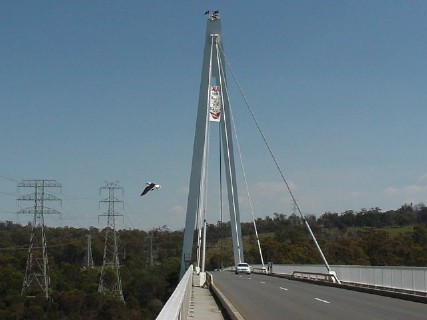
(or, to put it another way, 2008 + 1 = 2009)
Is there, in fact, anything to celebrate, really?
Well, yes - quite possibly. I began this website in early 2005, when it
seemed that the world (the "developed" world, at least) might be set to
continue in an indefinite state of catalepsy, pretty much oblivious to the
threat of disaster on many fronts. Those threats remain - but at least, it
seems that many are becoming aware of the fact and actively trying to do
whatever may help to address these burning issues.
The biggest issue in recent times has been the global economy, about which
I've already had plenty to say in these pages (in particular - and in
chronological order -
here,
here,
and
here).
Note that I'm not cheering about the very real hardship the meltdown
will cause on a grand scale for some time; but I am relieved, now
that the inevitable has happened, that the world has begun to wake up at
last and address the matter, along with other more-or-less related issues.
I may say that, while going back over these pages in preparation for this
one, I've been somewhat taken aback by the vehemence with which I expressed
myself in some (several!) of them. However, to me, that in itself is a
warning sign. When things begin to change in a positive way, there's a
tendency to "take the pressure off" a little and relax - even to wonder at
one's former passion. But, as I've mentioned before, that's specifically
the time to stay focused and determined to see things through to
their conclusion, exactly as the generation in which I grew up
failed to do some thirty or forty years ago, at great cost (as has
become painfully evident in recent times).
So this page is an attempt to take stock of where we are now, and to try to
see a way forward. I've mentioned earlier that I was considering producing
an "e-report card" for Australia's federal Labor government, which has now
been in power for a bit over a year; and this seems like the ideal place to
do so.
Not, I imagine, that politicians particularly like having to put up with
this sort of scrutiny. Indeed, only two or three weeks ago, a former
Tasmanian State parliamentarian had a letter published in Launceston's
newspaper, "The Examiner", complaining bitterly about journalists giving
"report cards" to politicians, saying that the only judgment that matters
is the result at an election.
Well, I don't consider myself to be a journalist, exactly - more a
commentator, I suppose. Whatever! As far as I'm concerned, in a
properly-functioning democracy, the political process is a day-to-day
affair; and any citizen has the right to express an opinion, at
any time, about any political issue - including, if
necessary, the performance of individual members of parliament - whether
there's an election coming up or not; and that's exactly what I intend to
do right here, without apology.
It's been a bit over a year since we've had a change of federal government
in Australia. In fact, it was Saturday 24th November, 2007 - a day which
many (myself included) hoped marked the beginning of a major change of
direction for Australia. I've already posted a web-page discussing some of
the issues of that time; click
here
to see it.
It's not too hard to see, with hindsight, why the Aussie people threw the
Howard government out. It has to do with one very simple but vitally
important concept:
RESPECT
When a democratically-elected government loses respect for its
constituents, they will eventually lose respect for their government. That's
exactly what happened in Australia in 1996, and again in 2007. When the
"powers that be" think that they can get away with treating the citizenry
with contempt, they will pay a heavy price.
You may have noticed that I've developed a penchant for including,
in some of my most recent web-pages, "mood" photographs depicting weather
conditions in my local area. True to form, the rainbow picture above was
taken looking eastwards, in the general direction of Mount Barrow. I took
this one after a very welcome rain-shower on Monday, 1st December 2008
(just a few weeks ago). Not quite as dramatic as the one which heads my
new millenium
page, perhaps; but quite appropriate as an introduction to my thoughts on
the events of the last year or so.
So, with not quite eight months before the election would be called, the
Aussie public settled down to see how the new oppostion leader would fare.
It must be said that it's a tough ask. We'd had a succession of Labor
leaders during the Howard years, none of whom had succeeded in pulling off
the big result at a federal election. How would the "new boy" stack up?
What approach would he take?
At the previous election, in late 2004, Mark Latham was the leader. He
started out quite strongly, and definitely gave John Howard some
uncomfortable moments - but he seemed to lose both his focus and his
temper toward the end of the election campaign, thus playing right into
the very cunning hands of the conservative government.
Prior to that, since the mid-to-late 1990's, Labor leaders had always come
across as absolute gentlemen - which is probably why they didn't succeed.
Politics is not, essentially, a gentlemanly business. By its very nature,
it's adversarial; and "nice guys" rarely win - and if they do, they
generally don't last long, because there is always someone within their
own ranks with a much more nasty attitude who will stop at nothing to get
the top job. (We've had plenty of that in Australia down the years, in
both federal and state politics.)
So - what would Kevin Rudd do? What theme would characterize his
leadership?
By typing "Kevin Rudd" "me too" into Google, I found that there are
lots of journalistic web-pages out there with some commentary on
the matter. Here's a more-or-less random sampling of links to three of
them:
Ninemsn (an interview with journalist Laurie Oakes)
From my own perspective, I had an initial "uh-oh!"-type reaction to
the "me too" phenomenon. (I still had bad memories of the Hawke/Keating
era.) But, in short order, I'd figured that in this case, the devil we
didn't know couldn't really be any worse than the devil we
did know; and that anyway, events in the period immediately
following the election would be unpredictable, and who knew how things
might develop - so it wasn't going to dissuade me from voting Labor on
this occasion!
- And, of course, I was right in that regard. Who could have foreseen how
the looming economic disaster would develop, and how that would affect the
new government's actions? But let's not get ahead of ourselves...
I can understand why Mr. Rudd might have chosen to use the "me too"
approach. The fact is that John Howard, being a classically wily
politician, had had eleven years to hone to perfection his talent for
turning just about anything uttered by opposition members into some kind
of negative for them. So by taking this line, Mr. Rudd became a
hard-to-hit target, thus able to keep the initiative, focusing on the very
real issues which were turning the electorate away from the government in
droves - finally. So I could admire it as a clever move from that
perspective. I just hoped, though, that once they got in...
Once they got in, things began to happen very fast (as I've already
mentioned in my
"new millenium"
page). The Kyoto protocol on climate change was ratified; an official
apology was given to the Aboriginal community for the "stolen
generations"; and the issues of industrial relations and immigration began
to be addressed. Health and education were on the agenda. All of these
were primary issues which had led to the eventual downfall of the Howard
government. The new government, it seemed, was living up to the
expectations of the electorate very well.
All of this was happening against the backdrop of rumblings about possibly
very serious financial troubles orginating in the US. It was impossible to
push to one side the thought that it could all have dire ramifications for
the whole world, including Australia. However, in the euphoria of
significant political change here, it was still possible not to be
over-concerned about it - yet.
By the middle of the year, the momentum appeared to have slowed. It seemed
that the new government had lost some of its focus. Very noticeably, Mr.
Rudd was zooming off around the world to various international meetings -
and of course, the opposition (i.e. the remnants of the former Howard
government) starting carping about that. "Why isn't the Prime Minister
home, addressing local issues?" was the sentiment being expressed.
However, it didn't seem to be registering on the public radar; after
eleven and a half years, the Aussie people had become pretty bored with
that sort of thing.
Of course, leading political figures need to be active on the
international stage - especially new leaders, who need to get up to
speed with what's going on around the world. I don't think most people saw
anything wrong with it; quite clearly, Mr. Rudd wasn't "joyriding" - he
was very publicly engaged with his work as Australian PM wherever he went.
By whingeing about it, the Liberals didn't do themselves any good at all!
- And then, the credit crunch hit - and everything else paled into
insignificance.
A major part of Kevin Rudd's "me too-ism" had been his assertion that he
was an "economic conservative". In the Green Left Online link above, Mr.
Rudd is quoted as having said, in May 2007:
People have described me as an economic conservative. When it comes to
public finance, it’s a badge I wear with pride.
Now - just what the !@#$% does "fiscal" mean?
It's not the sort of word I use in everyday speech. I'm far more
comfortable with concepts like Klein bottles, free abelian groups,
pi-orbitals, and zero-point energy than I am with funny terms like that.
Out with the Concise Oxford Dictionary (1990 edition), and let's have a
look:
fiscal adj. & n. -adj. of public revenue. ...
Well, that's clearly the bit we want, so let's not bother with the
n. definition. (Just by the way - I tried to look up "abelian" in
the Concise Oxford, but it's not there! You'd probably have to look in an
Abstract Algebra textbook for that. Or, you can click
here
if you're interested... there's even a bit about "free abelian groups"
there, too! Good value, n'est-ce pas?
Okay - so it's about governments using taxpayers' money. (Now we
know what it means, in plain English.) Over eleven and a half years, John
Howard's government, one of the highest taxing governments in our
country's history, had built up a colossal "surplus", courtesy of the
hapless Aussie taxpayer (I've addressed this matter previously in my
Why is Mad Teddy mad?
page, written in early 2006 and part of the original content of this
website). So being a "fiscal conservative" means that you're going to
careful how you spend it, if at all. Right?
Clearly, both John Howard and Kevin Rudd would have liked to be seen as
more of a fiscal conservative than each other, that being the prevailing
fashion.
I've had a bit to say about how the financial meltdown (thus far) has
affected Australia in my
Strange days indeed
page. I posted that page in October 2008 (just about three months ago);
and since then, of course, a lot has happened.
Almost unnoticed, and without any real fanfare, the Australian federal
government has committed to spending $4.7 billion dollars of John Howard
and Peter Costello's precious surplus to help fix up our badly damaged
economy, largely by investing in infrastructure in order to create jobs.
(Click
here
and/or
here
to read some press-releases about it.)
So - is Kevin Rudd still a "fiscal conservative"?
Who cares?!! It's just a phrase, after all. The important thing is, the
government is effectively giving back the money to the long-suffering
Australian people, in a way that - hopefully - will benefit the entire
country.
And that gets a big tick from me!
Contrast this with the "bailout" or "corporate welfare" approach of
pouring taxpayers' money into those very businesses that have actually
given rise to the problem, by their unbridled greed. All the government
is doing by taking the "nation-building" approach is giving back to the
people what was always rightfully theirs anyway, in what is almost
certainly the most effective way possible.
Of course, those opposed to this approach will say that the government
needs a surplus, for a "rainy day" - suggesting that the "rainy
day" is right now, with the economy in disarray. Of course, what they
won't admit is that the approach, in recent times, of running
absolutely everything as a business - including the very country
itself - has led to the mind-set which caused that "rainy day" to occur in
the first place!
Businesses need to run at a profit - fair enough. Workers have to be paid;
everyone needs to eat and have a roof over their head; and private
companies have a legitimate right to grow. But governments, if they are
doing what they should be doing, are not businesses or private
companies; so there is no reason why they should run at a profit - or
"surplus" - at all! Surely, governments - if they are representing their
citizens properly - should attempt to break even, rather than to have
either a substantial surplus or a substantial deficit. Perhaps this is
finally beginning to be understood by our leaders, at long last.
It reminds me of a situation which occurred when I was at university in
the mid-1970s. The university cafeteria (known as the "refectory", or
"ref" for short) was operated by the Students' Representative Council
(SRC). At one point, when the ref's management proudly announced that they
had made a fairly substantial profit over the preceding financial period,
all hell broke loose. As far as the students were concerned, this quite
simply meant that they were being ripped off - and they said so, in loud
and angry tones. Now, what's the essential difference between a situation
like that and a democratically-elected government profiteering at the
taxpayers' expense? I put it to you!
On 20th January 2008 (just under a year ago), the new federal government
announced that it would be holding "Community Cabinet" meetings around the
country. The idea is that the Prime Minister and members of Cabinet would
hold meetings at which members of the public would have the chance to ask
questions and possibly have a one-to-one meeting with a Cabinet member.
Click
here
to read more; also
here.
As soon as I heard that one of these was to be held at Launceston's
Newstead College on Wednesday, 5th November 2008, I made a point of
putting my name down as a member of the audience. I also requested an
interview with the PM, hoping to have a few minutes to talk to him on the
subject of "Energy for the Future".
There was no problem with attending the forum (i.e. the main meeting), but
I was unsuccessful at gaining an interview with Mr. Rudd. Nevertheless,
ever the optimist, I prepared myself as well as I could on the off-chance
that fortune would smile on me and I might get my opportunity after all.
Just a few days before, I had successfully constructed the following
gadget:
It's an odd little motor whose rotating element is one wheel from
somebody's old skateboard. (I found the pair of wheels in my favourite
Launceston junk-shop; I'm a regular customer in there, and I'm sure they
must think I'm quite loopy.
Without going into a lot of detail, it runs at a very impressive 3,000 rpm
on a single nine-volt battery, which lasts for quite a long time - and it
continues to run (albeit a bit more slowly) even when the battery starts
to wear out.
It's my first attempt to construct a machine which draws at least
some of its motive power from zero-point energy. If you'd like to
know where it derives its inspiration, click
here.
So what, you might ask?
Well, I took it with me, carefully concealed in a shoe-box, when I went to
the Community Cabinet meeting. I left it in the car; I didn't dare to try
to take it in with me in case some security person thought it might be
some kind of
WMD,
which might possibly have landed me in a spot of bother.
I thought that if my path and Mr. Rudd's should happen to cross at some
point, I might find a way to bring it in and demonstrate it - and it might
thus provide a means of getting my point across after all.
The federal Labor parliamentarians know about me. Ever since the
disastrous 2004 federal election, I've been mass-emailing them, on and
off, about various issues, hoping to be a "voice in the wilderness" of
which they might just take some notice. As part of the process, I've made
a particular point of drawing their attention to this website. So I did
give myself an outside chance of placing a word in the appropriate ear at
the Community Cabinet meeting.
It didn't do me any good, though; I didn't get my chance to demonstrate my
little gizmo and thus raise the subject of
zero-point energy
as a serious topic of conversation. Perhaps if Mr. Rudd and his
colleagues see this page, they'll realize what they were missing out on.
Just before moving on - I've since built another motor of this same basic
type. This time, the rotor is an old CD-case with four powerful magnets
inside; it spins very happily at 5,000 rpm on a 20-volt DC supply, taking
about about half an amp - which means that it's running at about 10 watts.
Here it is:
The sound it makes, as it gets up to speed over a minute or two, is
reminiscent of a light plane warming up ready for take-off.
I'll be having a lot more to say about these and related matters in this
website fairly soon; so do keep coming back to see how things are
progressing...
*
*
*
*
*
Even though I didn't get the chance to have any real individual input, I
found the Community Cabinet meeting to be a worthwhile experience.
I formed the distinct impression that most people there were basically
on-side with the government, but concerned about specific issues. When I
arrived outside the venue, there were at least two protests happening: one
about Aboriginal rights, and the other about the proposed Tamar Valley
pulp mill.
When the new Labor government took power in November 2007, they inherited
a certain amount of "baggage" from the former Howard government. Part of
this had to do with a very vexed issue concerning Aboriginal rights in
Australia's Northern Territory. It's a complex matter which I don't feel
qualified to address here; if you'd like to read more about it, you may
find the following links helpful:
Wikipedia article on "Northern Territory National Emergency Response"
The other protest was organised by "Tasmanians Against the Pulp Mill"
(TAP). I've taken part in their rallies before, and may do so again
(for example, see my
It's still not easy being green
page, beginning just over halfway down; also, have a look at my page
specifically about the issue
here,
and perhaps check
this
out). On this occasion, however, I had my own agenda (as detailed above),
so I decided not to join in the TAP protest. One can only do so much...
The pulp mill issue was very much in evidence at the Community Cabinet
meeting. Some people put their hands up and were given a chance to say a
few choice words about it, basically requiring the government to explain
why they hadn't taken the opportunity to put this matter to bed
once and for all.
I'd heard in various media reports over the months that the Rudd
government's approach was to proceed with "environmental studies"
initiated by the Howard government. The Environment Minister at the time
was Malcolm Turnbull; the studies had been in process when the election
was held in November 2007.
Frankly, I hadn't put too much store on these studies. It was no secret
that the Howard government would always support "business" over absolutely
everything else. Would the results of any "studies" convince them to stop
the pulp mill going ahead? Pull the other one!
So when the new government effectively continued with this policy, there
were plenty of very unamused people down here, let me tell you - myself
among them.
Somebody raised the issue at the meeting. Mr. Rudd took the podium and
reiterated, in our hearing, the point that Environment Minister Peter
Garrett was committed to complete these environmental studies before
making a decision as to whether the pulp mill was to go ahead.
It was a polite, restrained audience; but you could have cut the
prevailing mood with a knife. The undercurrent of barely suppressed rage
was palpable. There were a few growled interjections; I think I may have
uttered a teddy-bear-like growl or two in that vein myself. Most people
simply sat there in stunned silence; but their facial expressions were
eloquent.
The politicians just didn't get it. This blasted issue has been dragging
on for so long; every poll taken shows that the vast majority of
Tasmanians do not want this pulp mill - but still, on it goes.
We are not ignorant peasants down here. We are fully cognizant of all the
issues. The scientific aspects have been repeatedly aired, and well
understood, for years.
The group originally charged with an environmental impact study was
Tasmania's Resource Planning and Development Commission
(RPDC).
When this organization - doing its job thoroughly and meticulously, a few
years ago - "failed" to give a green light to the mill's proponents, they
(the proponents, not the RPDC) withdrew from the process; and the
Tasmanian government introduced legislation to "fast track" the required
approvals. But we, the people, were not fooled; we knew that this was all
about trying to draw attention away from the scientific findings to date
which were certainly not favourable to the mill's approval.
We, the people, know all the relevant facts; and we also know that the
mill's proponents have constantly tried to twist the evidence around to
suit their own purposes, and will continue to do so. "Spin" is alive and
well in Tassie - we all know that.
I do not understand how or why Kevin Rudd's government feels that it is in
any way beholden to what Malcolm Turnbull may or may not have already done
with regard to this matter. The Australian public threw out the government
of which Mr. Turnbull was a part, very resoundingly, just over a year ago
- thus sending a message which couldn't possibly have been any clearer:
"We want CHANGE, big change, and we want it NOW".
With my first grandchild on the way, this is a very personal issue for me.
I don't want our beautiful island to lose the very things that make it so
special. I'm sick of all the smoke and mirrors. I just want this place to
continue to be what it has been since I first came here as a child:
home.
I'm fed up with successive governments, both federal and state, whether
(ostensibly) on the "left" or the "right" side of politics, paying no
attention to what the people think and want - the very principles that are
supposed to define a democracy.
I'm nauseated by the arrogance of the mill's proponents who seem to think
that elected politicians owe them their allegiance. Launceston's
newspaper, "The Examiner", reported on Wednesday, 7th January 2009, that a
senior spokesperson for the company which wants to build the mill
... expected Mr. Garrett to play politics to appease environmentalists but
he expected support from the local member.
I've had a gutful of what can only be described as corporate government. I
couldn't give a damn about what further long-drawn-out "studies" by Mr.
Turnbull, Mr. Garrett, or anybody else, come up with, seemingly in the
hope thar we "greenies" will just give up and quietly fade away. It's gone
beyond all that, now. We know what we want - and we won't settle
for anything less. We want this pulp mill killed stone dead,
right now.
Only a few days ago, on 5th January, Mr. Garrett released his report. We
had been led to believe that it would finally give us an indication of
whether the federal government would support the mill, or reject it at
long last. Instead, it turns out that we're going to have to wait for
about another two years, while further studies are done! Click
here
to read a gleeful Liberal Party "take" on the matter, and
here
to see a Green perspective from a member of the Tasmanian state
parliament. Also, click
here
to read a recent media release by Senator Christine Milne, one of
Tasmania's strongest campaigners on environmental issues over many years.
On and on and on and on and on it goes...
The mill will be knocked on the head eventually, believe me
- come what may. We Tasmanians will see to that. We are determined. It
would just be so much better if the new federal government, which seems to
have so much potential in so many ways, could be a part of that process
(and sooner, rather than later), instead of undermining it.
In my
... Love this river... ?
page, down toward the end, I've presented information which originated
with the TAP people to the effect that each one of the five Tasmanian
federal parliamentary seats is held by a member of the Labor party only
with support from Green preferences. This means that every one of
those electorates - even Denison (the greater Hobart area), formerly a
safe Labor seat - is now marginal. (Please, do visit that page and
read the details.)
What this means, in practical terms, is that the Rudd government
potentially has a big problem down here. The electorate of Bass,
which comprises Launceston and the north-east of Tasmania, has a
reputation for being marginal, and is often used as an indicator of the
country's political mood. (There have been occasions when Bass has had a
very important - even pivotal - rôle to play in federal politics.)
Now, with all five electorates effectively "up for grabs", the
Rudd government would be extremely unwise to get us Tasmanians offside -
because there is every chance, if it does, that it could lose the next
election, a little less than two years from now. That would mean a return
to a right-wing conservative federal government à la John Howard -
and I, for one, don't want that to happen any more than Kevin Rudd and his
colleagues do!
How much simpler can it be?
As I've said before (again, in my
... Love this river... ?
page):
*
*
*
*
*
Don't get me wrong. Of course, the scientific aspects of this are
important. Hard facts are essential to a meaningful decision-making
process. But the science has been going on for so long, and in so much
less than a sincere, transparent way, that we Tasmanians no longer believe
in the legitimacy of the process. We no longer have any faith in it at
all.
There are other aspects to consider, other than the purely scientific.
Tasmania is famous world-wide for its "clean green" image. We have a
tourist industry which is largely about precisely that. We have a thriving
primary industry sector (including vineyards which produce fine wines),
which also relies heavily on that vitally important reputation. (Some of
these vineyards are close to the site of the proposed pulp mill.) These,
and other matters, are at high risk if we get a chlorine dioxide-based
pulp mill on the island. Perception is incredibly important. The federal
government knows that.
While this dreadful matter grinds on, harm is being done all the time.
Apart from Tasmania's worldwide reputation being sullied, we who live
here are getting angrier every day. It's not a way we like to be. We like
to think of ourselves as a pretty cool bunch.
There are half a million of us living here. You tell me - why should a
handful of rude, arrogant, greedy businessmen have any right to steal our
way of life, and our joy in living here, away from us? How does that have
anything at all to do with democracy?
When all is said and done, it comes down - as always - to one single,
simple, all-important concept, already mentioned near the top of this
page:
>>> RESPECT <<<
This page has already grown quite long; however, there are still a few
more things I'd like to mention. I'll try to be as brief as possible.
*
*
*
*
*
Over the last few months, the federal government has been making noises
about internet censorship. It's an old chestnut which pops up every so
often; the reason usually given is that firm measures need to be taken
against child-abuse. Click
here
to read a well-thought-out (if somewhat cantankerous) article about it.
However, the internet (including the World Wide Web) has been with us now
for quite a long time. Over the years, there have been many calls to
control what is available on it - but they rarely seem to last long.
Why would that be? Is it that people just don't really care, after a
while? Or is there likely to be a more logical reason?
If it could be done effectively, no doubt it would have been done long
ago. (I'm quite sure that the previous Australian federal government would
have just loved to get things off the net that showed it in a poor light.)
Similarly, who wouldn't want to prevent terrorists from depicting their
"executions" of hostages on the web?
The simple fact is that it can't be done. Any attempt to censor the
internet is doomed to failure. In the end, the only way to locate and
prosecute perpetrators of atrocities on-line is by good old-fashioned
policing.
Why won't internet censorship work?
There are several reasons, all of which are now well-known: no filter can
be made which can be guaranteed to remove all the specified undesirable
content; any filter will remove innocent content as well as (some of) the
target content; there are ways to get around any attempt to filter if the
user is a "hacker" and knows how to go about it (and such people will
always be one jump ahead of everybody else) - etcetera, etcetera.
Perhaps the most telling practical reason is that such filtering,
ineffective though it is doomed to be, will simply slow the internet down
to an unacceptably low speed.
One of the policy platforms on which the present government stood during
the run-up to the 2007 election was internet speed - in particular, fast
broadband access for remote areas. Very laudable; but slapping a
country-wide filtering system on it will simply cancel out any benefits of
such high-speed technology!
The issue seems to have faded away in recent times, perhaps because it's
been forced off centre-stage by the economic crisis. Hopefully, it will
stay that way; with a bit of luck, the government will realize that there
is no point in backing an inherently unworkable idea.
Finally, of course, there is at least the perception that the motivation
for any censorship by government is highly suspect, and can only
ultimately serve to drive a wedge of mistrust between the government and
the citizens. In the final analysis, that may well be the best reason for
the government to simply drop the idea.
I certainly hope so.
*
*
*
*
*
Another issue that has arisen in recent times is that of greenhouse gas
emission reductions.
In the lead-up to the 2007 election, with the issue of the Kyoto protocol
firmly on the table as an election issue, many Aussies hoped for great
things from a Rudd Labor government on environmental issues.
Well, I'm very much afraid that we've been somewhat disappointed, thus far
at least! The Government has come up with a target of a five to fifteen
percent reduction in greenhouse gas emissions by 2020.
It's not anywhere near enough. Click
here
to read an SBS World News article about it.
Now click
here
to read a transcript of an ABC interview with the Minister for Climate
Change and Water, Penny Wong.
About a third of the way down, you'll find the following statement from
Ms. Wong:
Well unlike some of the people who are criticising us, the Government
understands you don't achieve a target just by setting it. You have to
have a plan to get there. We have a plan to get there - a comprehensive
emissions trading scheme in the carbon pollution reduction scheme - the
most comprehensive in the world, covering 75 per cent of the Australian
economy.
But the statement above does sound like a capitulation. Saying "you don't
achieve a target just by setting it" misses the point, in my view.
You have to start somewhere. The question is where. When I
was in my first year at high school in the mid-1960s, the principal - a
short, pugnacious-looking man with a twinkle in his eye - had a saying
that he used to trot out at every opportunity: school assemblies, speech
nights, whatever. If my memory serves me correctly, it went like
this:
But I do believe we can both set high targets and actually
reach them, on this matter of climate change. If you've visited
this website before, I'm sure you must have picked up on my firm belief
that the answer is within our grasp. It has to do with
zero-point energy,
which pervades the whole universe in vast quantities and can be accessed
for every energy need we could ever have, if we just get on and develop
the technology.
If you're sick of hearing me say it, I'm not sorry. I'm committed to
adopting the same approach that old Lou Amos, Principal of Launceston High
School, used to implant his message about stars and treetops in my mind.
If I keep on throwing it out there long enough, perhaps the penny will
eventually drop, and some people in high-enough places will get involved
at last, and things will start to happen.
I'm just one member of an internet-based community of people who are doing
what we can to help bring this about, as soon as possible, hopefully
before it's too late. I'll be posting a lot more about it in this
website very soon. In the meantime, may I encourage you to get involved:
read other pages in this site which address the issue, and do some hunting
on the web yourself, to see what you can find out about it. The matter is
urgent.
UPDATE, Saturday, 24th October 2009:
On Friday, 10th July 2009, I included a new menu entitled "Mad Teddy's
researches into zero-point energy" within this website. There are (so far)
five links to new pages within that menu, three of which are of an
introductory/speculative nature and two of which provide details of two
working models of monopole motors - my first attempts to get involved with
what I hope will soon be adopted as the ultimate technological solution to
the world's current enormous environmental problem. Please, do click
here
to see this new material.
Nearly there - just a few more bits'n'pieces to add.
On Tuesday, 7th October 2008, I noticed a weird-looking weather phenomenon
over toward the east (as usual). You could be forgiven for thinking that
it was an enormous tornado swirling around not very far away. Fortunately,
it wasn't; but whatever it was, it looked disctinctly murky. Of
course, being me, I just had to grab my old Sony Mavica camera and take a
few snaps of it.
I suppose in some ways it mirrors my mood regarding much of what I've had
to say in this page, which I haven't found easy to write. It's far
easier to produce a straightforward rant, like several earlier pages in
this site - when an issue is very clear-cut and one can simply yell in the
hope of drawing attention to something which is just dead wrong, in
the hope of motivating enough other people to get on-side and help sort it
out ASAP.
That's not quite the case here. Having been a teacher, I know from
experience how difficult it is to write a report on a student whom one
knows has great potential, and whom one really wants to motivate - but who
simply doesn't get it.
It's like walking a tightrope. On the one hand, you want to encourage -
rather than discourage - the student; but on the other, you don't want to
give the impression that they're doing enough, when they quite clearly
aren't. Getting the balance of "carrot" (praise) and "stick" (constructive
criticism) just right is a very tricky business.
So - has it been a waste of time writing an "e-report card" on the first
year of the Rudd Labor government?
Hopefully not. Looking on the bright side, at least we now have a
government which we know is capable of having some worthwhile
ideas, rather than the useless outfit it replaced. So there's always hope.
*
*
*
*
*
There are some other issues which look like clouds on the horizon for the
Rudd government.
For example, there are people in the Aboriginal community who are unhappy
with the government's position that the apology for the stolen generations
is not to be followed by compensation. Click
here
to read an article about this, published on 28th January 2008. The issue
is still alive; there was something about it the news just a few days ago.
Why can't the government find a way to deal with this in a creative way
which would put some real meat on the bones of the apology?
Then again, a day or two ago I heard complaints that the "nation building"
program - mentioned earlier - is not proceeding fast enough.
A third and final example: the union movement is saying that the reforms
to John Howard's "Work Choices" don't go nearly far enough (Mr. Rudd had
promised that his government would demolish this iniquitous piece of
legislation "lock, stock, and barrel" - see his keynote speech, whose link
appears earlier in this page). Clearly, industrial relations is still a
vexed issue (as it always seems to be, for Labor governments).
So it seems that the government is very much on a learning curve - which
is only to be expected, after only a year in the job! As long as they
actually are learning, of course...
So I'm not giving them a "mark out of ten", as it were - or even a "pass"
or a "fail". I think it's too early for any of that, just yet. They still
have a little under two years to go before they have to take their first
real exam - in the form of the next federal election. For now, I'm
content to just give them a "progress report" instead, with a few pointers
which might hopefully prompt them to lift their game in specific areas.
I'll conclude this page with another photo taken on the same day as the
one above. This was taken when the sky was starting to brighten a bit, and
that odd-looking object could be seen as quite simply a shower of rain in
the middle distance. Much more like what we'd prefer to see - in
both the political world, and the physical one we all inhabit!
I'm glad to have finished this difficult page at last. (It's been
bothering me for weeks - certainly since before Christmas - and it's taken
a lot longer to prepare than I'd hoped it would.)
So now I feel free to go ahead and concentrate on what I view as the
biggest issue of all - climate change. As mentioned above, I'm hoping to
add more pages to this website soon, detailing my own researches and
deliberations about zero-point energy
(that process now having begun, as also mentioned above, 24-10-2009)
- the only way, in my
opinion, that we are ever going to have a chance to fix our badly damaged
world. Please, keep revisiting the site, and spread the word.
- And join us, in aiming for the stars.
UPDATE, Tuesday 20th January 2009
Someone whom I've known for a long time has pointed out to me that I've
made the classic error of pining for the "good old days" (forgetting that
Tasmania in the 1960's, when I first came here as a boy, was not
perfectly idyllic) - by reminding me that there were indeed polluting
factories here even back then, plus sundry other environmentally
disgraceful practices (some of which have, thankfully, been rectified
since).
In fact, now I come to think about it, in the late 1970's I once actually
applied for a job with one of those polluting industries! Even then, I had
a vague sense of unease about it; now, with the benefit of thirty-odd
years of hindsight to clarify my thinking about such matters, I'm rather
glad I didn't get that job.
The point about the "good old days" is well taken. However, it in no way
detracts from the thrust of my argument about the proposed pulp mill -
quite the reverse, in fact. If that goes ahead, it will dwarf any of the
prior offenders; I've read that it will be the
biggest
pulp mill of its kind in Australia, and may well be one of the biggest in
the world.
So I'm glad that the public (of which I am a member) is now far more aware
of threats of this type than they were decades ago. But that fact can't be
allowed to make us complacent. The battles continue; and if we relax our
guard, we're done for - and, as I've mentioned in other contexts within
this website, that will never
change.
(Click
here
for another video about the proposed pulp mill.)
*
*
*
*
*
Just one other thing: originally, I wasn't going to include this in the
site - but I've changed my mind. Here's the placard I held at a rally
about the pulp mill in August last year (2008):
23×251 + 1 = 72×41
This page added on Saturday, 17th January 2009
That's right - in typical, nerdy Mad Teddy fashion, I'm celebrating the
change from 2008 to 2009, just two and a half weeks ago, using a bit of
"prime factor" notation.

So there! 


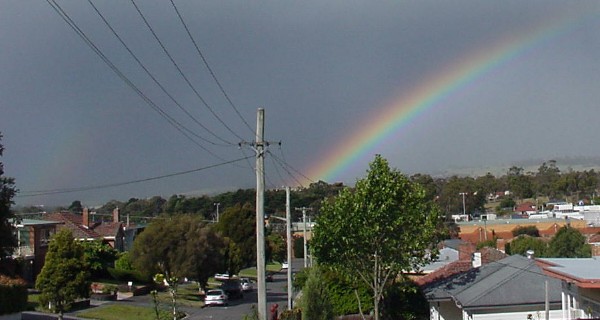
*
*
*
*
*
“My name's Kevin, I'm from Queensland, I'm here to help”
So spake Kevin Rudd, new leader of the federal Labor opposition, in his
keynote address
to the Australian Labor Party conference in Sydney, on 27th April 2007.
“ME TOO”
In all fairness, I don't think that Mr. Rudd ever put it quite so bluntly
- but that simple (and ungrammatical) two-word expression was what the
media latched onto, to describe his approach. The basic idea was that a
Rudd government would leave most of what the conservatives had done pretty
much alone, concentrating only on what were seen as fundamental
differences in policy as targets for change.
The Daily Telegraph
Of course, as you'd expect, each such news outlet places its own "spin" on
the subject matter. (Wouldn't it be boring if they all agreed with each
other?!)




Now, click
here
to read an article in "The Age" newspaper's
website, published on 15th November 2007, which reports how, the previous
day, Kevin Rudd had claimed the tag "fiscal conservative" for himself.
 So what does it mean?
So what does it mean?
 )
)


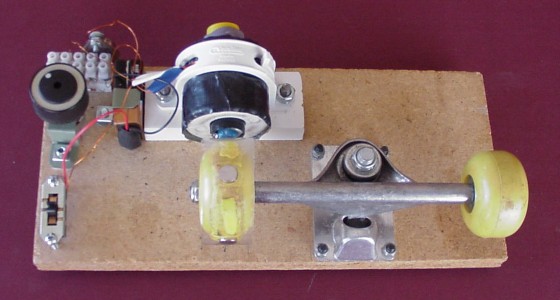
 )
)
 In fact, I made a special point of wearing my "madteddy.com" T-shirt,
under my pullover. I managed to get a seat in the meeting on the centre
aisle, quite near to the front of the hall (about a quarter of the way
back), and waited until things were under way before removing the
pullover. So they knew I was there, all right.
In fact, I made a special point of wearing my "madteddy.com" T-shirt,
under my pullover. I managed to get a seat in the meeting on the centre
aisle, quite near to the front of the hall (about a quarter of the way
back), and waited until things were under way before removing the
pullover. So they knew I was there, all right. 
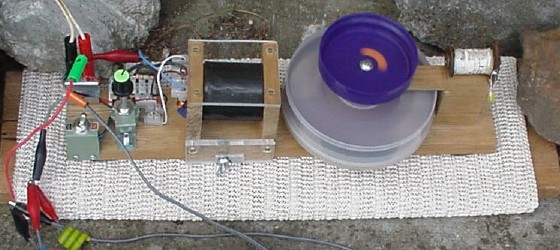
A "New Statesman" article by Aboriginal lawyer Noel Pearson
A point of view from www.listenupaustralia.org


Oh, he did, did he?!! Well, that's a sad reflection on the condition of
what is supposed to be a parliamentary democracy in our part of the world,
isn't it?
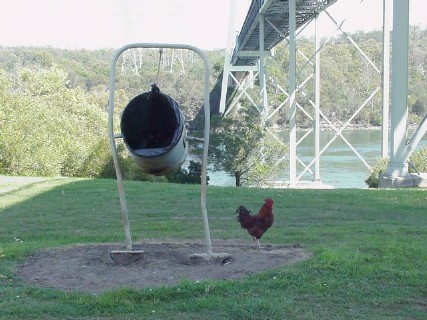
DON'T TRASH TASMANIA


I understand that it's a difficult, complex issue. I'd hate to be in Penny
Wong's position; her very important portfolio can only be seen as a
poisoned chalice. No matter what you decide to do, you'll never please
everybody.
“...If you aim for the stars, you might just hit the treetops.
If you aim for the treetops, you'll never get off the ground.”
I heard this enough times for it to stick in my mind - and, of course, he
was absolutely right! It is important to set lofty goals, even if
ultimately we rarely - if ever - succeed in reaching them.

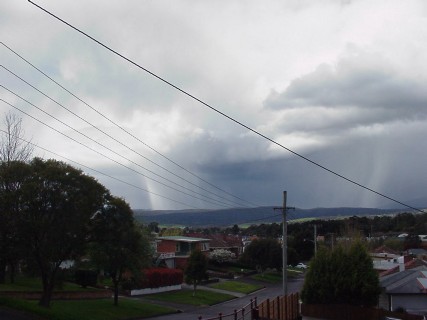
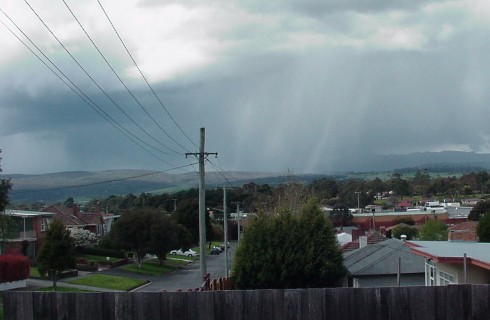

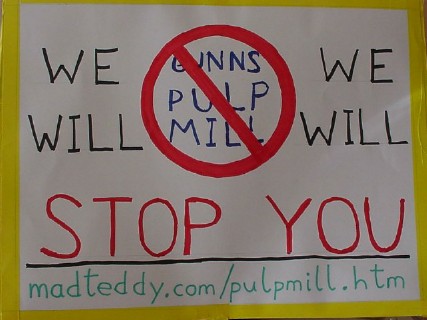


 Return to Unequivocal ursine utterances menu
Return to Unequivocal ursine utterances menu
